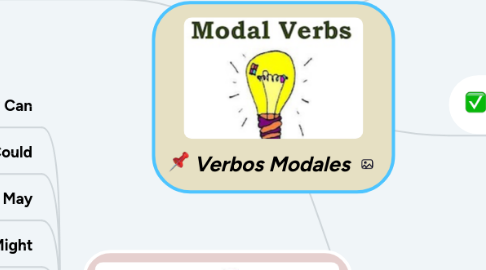
1. Principales Verbos Modales Ingleses, o “Modal Verbs”
1.1. Can
1.1.1. Ejemplo
1.1.1.1. She can be very annoying
1.1.1.2. Can you pass me the salt, please?
1.1.1.3. I could play tennis when I was younger
1.2. Could
1.2.1. Ejemplo
1.2.1.1. Could I say something?
1.2.1.2. Could I speak to you for a minute?
1.2.1.3. He could type on the keyboard without looking at it.
1.3. May
1.3.1. Ejemplo
1.3.1.1. May I ask you something?
1.3.1.2. May I have this dance?
1.3.1.3. He may come tomorrow
1.4. Might
1.4.1. Ejemplo
1.4.1.1. He might call the supervisor
1.4.1.2. The plumber might come tomorrow
1.4.1.3. Ana might be late
1.5. Will
1.5.1. Ejemplo
1.5.1.1. Will they find a cure for cancer?
1.5.1.2. They will graduate in two years
1.5.1.3. Will you switch on the light
1.6. Shall
1.6.1. Ejemplo
1.6.1.1. Chris shall be happy to see you
1.6.1.2. Shall we meet at the theatre
1.6.1.3. I shall have dinner at home tonight.
1.7. Ought to
1.7.1. Ejemplo
1.7.1.1. I ought to come
1.7.1.2. He ought to pass his driving test easily
1.7.1.3. I ought to Know
1.8. Should
1.8.1. Ejemplo
1.8.1.1. I should finish work early
1.8.1.2. You should read a few books in English
1.8.1.3. You should always say “please” and “thank you”
1.9. Must
1.9.1. Ejemplo
1.9.1.1. We must leave now or we will be late
1.9.1.2. You mustn’t shout in class
1.9.1.3. We must phone Janet to tell her the meeting is cancelled
1.10. Would
1.10.1. Ejemplo
1.10.1.1. Would you answer the phone, please?
1.10.1.2. If I were rich, I would live in a boat
1.10.1.3. It would be amazing to live in a boat
1.11. Have to
1.11.1. Ejemplo
1.11.1.1. You'll have to buy some new clothes
1.11.1.2. I have to work tomorrow
1.11.1.3. I have to pass this exam because if I fail I won’t be able to go to Tim’s party
2. Los verbos modales son verbos auxiliares que usamos para expresar una opinión sobre si algo es probable o posible. También los usamos al hablar sobre habilidad, pedir permiso o hacer una petición.
2.1. Estructura
3. Características
3.1. - No se les añade la –s a la tercera persona del singular; - No utilizan el auxiliar do/does en la forma interrogativa o negativa - La mayoría no tienen una forma en futuro; - El verbo que le sigue en infinitivo no lleva to (a excepción de ought to); - No tienen un complemento de objeto.
4. Usos
4.1. Capacidad o Habilidad
4.1.1. Can y Could
4.2. Permiso y Posibilidad
4.2.1. Can, Could, May, Might
4.3. Obligacion
4.3.1. Must y Have To
4.4. Consejo o Recomendación
4.4.1. Should, Ought to y Shall
4.5. Probabilidad
4.5.1. Should y Ought
